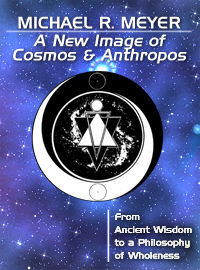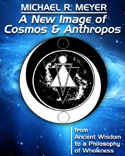
|

A New Image of Cosmos and Anthropos |

PREVIEW Part Three
The Metaphysics and
Philosophy of Wholeness The work of philosophy and metaphysics have been much neglected during the 20th century. Indeed, throughout the past century philosophy has been largely reduced to a propaganda organ for scientific materialism. But philosophy should, and today must, offer more than a meaningless, materialistic worldview of despair. It must throw new light on the path behind us and illumine the way to the future. It must provide us with new ways of seeing and understanding the universe and humanity, and it must offer us a meaningful place and function within Earth as a planetary organism. Metaphysics necessarily figure largely in a holistic, cyclocosmic philosophy, as it does in any meaningful worldview. But over the past century metaphysics has fared even worse than philosophy. As Huston Smith observes in Beyond the Post-Modern Mind, many influential modern thinkers seem to believe "attempts to locate man in his cosmic setting are compensations for intellectual or emotional weaknesses." Smith assure us that metaphysical thought will once again rise, because part and whole are in dialogue from the start. And because this is so . . . philosopher[s] cannot ignore metaphysics even if they abandon the existential questions to psychologists and theologians forthwith. As long as they retain their interest in epistemology, questions of unrestricted scope (i.e., metaphysical questions) will inevitably intrude. . . . I suspect that as our own century draws towards its close, metaphysical interest will quicken to such an extent that rebirth will appear a not inapossite metaphor. (pp. 22-23). But one may well ask: What is metaphysics really? Is there more to it than old Greek ideas and the sort of superficial and sensational material found in the metaphysical and new age sections of bookstores? Since ancient times, metaphysics has been regarded as the study of first principles and the endeavor to formulate a coherent, consistent and orderly interpretation of the basic facts of experience and existence. Metaphysics and philosophy are then interdependent, and philosophy must in one way or another deal with metaphysics. There can be no understanding, no ethics and no values—in short, no philosophy—without metaphysics. As Blavatsky writes in The Secret Doctrine, "outside metaphysics no philosophy, no occultism is possible. It is like trying to explain the aspirations and affections, the love and hatred, the most private and sacred workings in the soul and mind of the living man, by an anatomical description of the chest and brain of his dead body." (I:170). Nevertheless, the repudiation of metaphysics has long been vogue among scientists, psychologists, educators and professional philosophers. Yet such an attitude constitutes its own metaphysics—a mechanistic, materialistic metaphysics of assumptions, a dark "ateleological" metaphysics of denial breeding egoism, despair and alienation. But because scientific materialism is founded in a metaphysics of denial which obscures Wholeness and artificially fragments any whole into mere isolated parts, it must fall as science itself affirms Wholeness, showing that "part and whole are in dialogue from the start."
Read more and purchase the Kindle eBook at Amazon.com
Don't Have a Kindle? No problem! Download a free Kindle app for PC, MAC, Nook, iPad, iPhone, Tablets and Android devices at Amazon.com Text Copyright © 1995 by Michael R. Meyer All rights reserved  mail@khaldea.com Web design and all data, text and graphics appearing on this site are protected by US and International Copyright and are not to be reproduced, distributed, circulated, offered for sale, or given away, in any form, by any means, electronic or conventional. Unless otherwise noted, all text, data and graphics appearing on this site are copyright © 2000-2010 by Michael R. Meyer. All Rights Reserved. See Notices for copyright statement, conditions of use, and disclaimer. |About|Calendar|Ephemeris| |Charts|Art Gallery|Library|Resources| |Shop|Links|Rudhyar Archival Project|Help| Web design and programming for this entire site copyright © 2000-2004 by Michael R. Meyer. |
